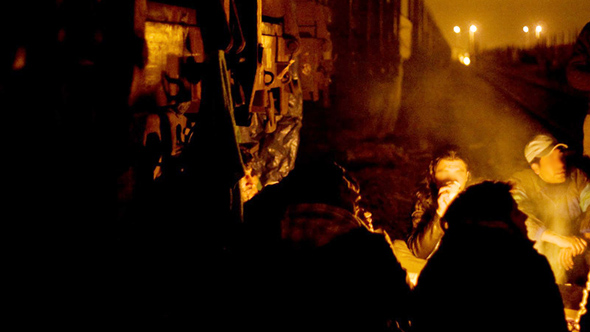
On the edge of the centre of town, an abandoned recycling factory sits at 10 Impasse Des Salines. Here over 100 migrants sleep at night and a further 300 arrive during the day to use the basic facilities and to have access to, what will be for some, their only meal of the day. The squat was occupied on the 12th of July and as of 24th of July, is facing eviction. A court order was served on Thursday requiring all the occupants to leave the 12,000 square metre location which means the police can turn up at any point to evict them. The squat, thought to be the largest in Europe, will be a test for the French Government – if Calais’s Mayor Buchart wants to remain defiant in her stance against migrants she will have to come down strong, unfortunately for the occupants.
Taken on the 12th of July, the squat was in response to a mass eviction of four squats including Salam, a food distribution point located near the port on the 2nd of July. In total, over 500 were evicted from Salam and a further 70+ from the other three squats. The raid carried out by the CRS riot police and PAF border police rounded up over 300+ and took them to detention centres in Coquelle, Lille and Amelot. Everything the migrants owned, including their determination, was destroyed. However, cases of police brutality are common among migrants and supporters alike; harassment, beatings and destruction of property is an almost daily occurrence with the migrants largely unable to legally challenge the authorities.
Organisations such as Medicine du Monde and Calais Ouverture et Humanite continually provide support in the form of showers, toilets and tents at not only this squat but the other camps the migrants have themselves built. Without that, the situation would be even worse with migrants requiring medical aid and food daily. An old house within the squat containing sleeping spaces, a kitchen and several toilets serves as a focal point for the remaining courtyards and three closed hanger spaces. Language classes, rights workshops and film screenings are organised to provide a level of education and to lighten the atmosphere. Artwork adorns the walls of the courtyards, each picture drawn telling the story of a battle for freedom and for a better life free from state persecution.
The migrants coming from Darfur in Sudan to Jalalabad in Afghanistan, and everywhere inbetween, have continually faced oppression from the police, local fascist group Sauvons Calais and mayor Natacha Bouchart. For most, getting to Calais was not easy with each and everyone having a harrowing story to tell of danger, death and deportation. They risk their lives every day, attempting to make what is for some a fatal crossing to England where they hope to gain asylum, having all but been shunned by the French Government. Most of the migrants live in a paradox, they are required by the 2003 Dublin Regulations to claim asylum in the first country they enter, however, for most this is impossible. In order to claim asylum in the UK, they first have to enter the country which means crossing illegally. They therefore exist in a quagmire. Some, despite the turmoil in their country of origin, go back through voluntary deportation that is offered by the French Government with the occasional migrant being able to claim asylum in France. However, for the majority, these options do not exist or are not viable alternatives. Their future therefore is bleak in Calais.
Facing a daily struggle and a battle between life and death, the migrants face countless dangers. The danger is increased by the neo-fascist group Sauvons Calais who have repeatedly expressed their hatred towards migrants and their backing of Buchart’s policies. Fascism and racism blur together as the group have repeatedly attacked migrants and targeted one squat which they pelted with stones and bricks whilst two terrified occupants waited inside. The threat of fascists is but a minor risk to take whilst attempting to cross the heavily policed border. Many will be found and taken back multiple times in one night only for them to try again the next evening. The EU’s border policies have to change if the suffering is to stop – we can no longer be ignorant to the fact that current border restrictions simply do not work and they will not work as long as they are imposed.
The future of the squat remains a difficult issue with the situation changing daily. The migrants do not want to leave as no solution has been proposed, no compromise has been sought. Support is needed. Numbers, whilst large, are still lacking if the squat is to remain. The squat is calling on people to mobilize in solidarity with their struggle, for people to come and participate and make it a place not only of creativity but importantly resistance.
By Daniel Martin









